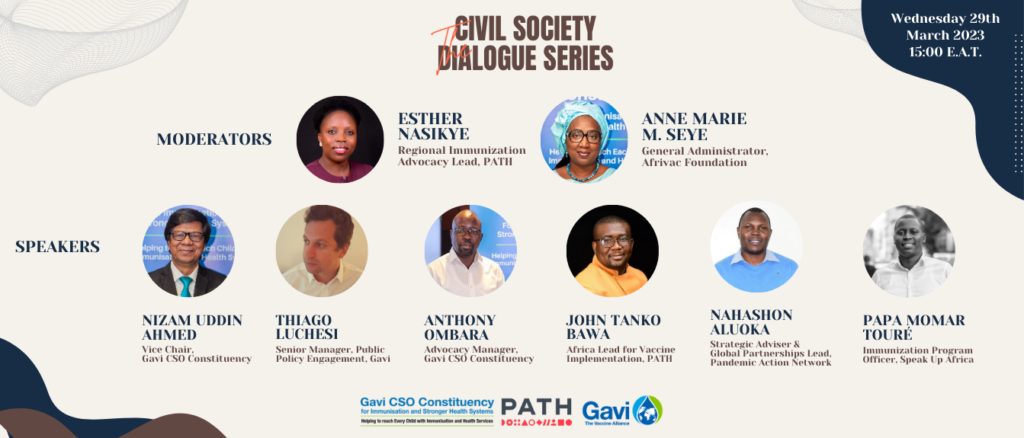Civil society organisations (CSOs) across Africa and the world gathered on the 29th of March 2023 to discuss how to maintain, recover, and increase strengthening civil-society-led advocacy towards renewed action for immunization in Africa. Over 120 CSOs agreed on fostering social and political commitment for immunization, Primary Health Care (PHC) and Universal Health Coverage (UHC); influencing regional and country policies for resilient immunization systems and service delivery; positioning immunization agenda in regional and global discourse.
The meeting was hosted by the Gavi CSO Constituency, Amref (the Gavi CSO Host) and PATH, and it was the first in a series of dialogues aimed at enhancing advocacy outcomes for immunization in the region. The main objective of the meeting was to drive towards increased domestic resource allocation for immunization in order to reduce dependency on external financing and ensure sustainability of immunization funding around available resource portfolios to achieve immunization Agenda 2030.
The meeting provided an opportunity for CSOs and Gavi to share their experiences and perspectives on immunization advocacy, During the opening session, speakers highlighted the importance of coordination among CSOs, strengthening partnerships and mutual accountability, and establishing information-sharing mechanisms and platforms within the constituency.
Dr. Nizam Ahmed, the CEO of National Telehealth Services and secretariat for the Bangladesh Parliamentary Forum for Health and Wellbeing, emphasised the need for countries to step up in order to bridge the gap created by the COVID-19 pandemic. He encouraged CSOs to partner and engage with multiple stakeholders at local, national, and global levels, including government, private sector, and community partners, to scale up immunization efforts.
Thiago Luchesi, Senior Manager Public Policy and Engagement at Gavi, also expressed the organisation’s commitment to working with CSOs, as engagement from civil society partners democratises health policy discussions at the country level and brings the voices of the communities around them to the forefront. Luchesi went on to discuss the new Gavi Civil Society and Community Engagement Approach, which aims to improve how Gavi funds civil society partners in countries.
“As Gavi, we are working on financial incentives to encourage advocacy from civil society partners, including incentives on health financing, with details to be communicated to CSOs.” – Thiago Luchesi
Dr. John Tanko Bawa, PATH’s Africa Lead for Vaccine implementation, drew attention to health inequities in Africa and how weaknesses in health policies and their implementation have contributed to 30 million children still suffering from vaccine-preventable diseases in Africa. He highlighted PATH’s work in promoting transparency and accountability for resources invested in immunization programs and supporting the integration and scale-up of new vaccines in various contexts.
The dialogue series that had both plenary and breakout sessions highlighted opportunities in policy and pandemic preparedness, prevention, and response. It also focused on identifying key activities to be included in the CSO work plan, moments to be leveraged, and resources and materials that can be amplified through the constituency communication channels. Participants were urged to join the Pandemic Fund Governing Board reset in May 2023, as well as to participate in the upcoming AU Mid-Year Coordination Summit in Nairobi, Kenya.
Overall, the dialogue series emphasized;
- the importance of civil society engagement in immunization advocacy and the need for coordinated efforts to achieve immunization Agenda 2030.
- the urgency of the immunization issue and the critical role of CSOs in achieving sustainable funding for immunization programs.
- the importance of building and sustaining political will at all levels of governance and the need for innovative and sustainable funding models
The dialogue series closed with a call on CSOs to register as members, and with a promise to keep them appraised of the next dialogue series. The CSOs also agreed to a collective commitment to drive their advocacy efforts towards increased domestic resource allocation for immunization in Africa.
In conclusion, the CSO dialogue series was a vital opportunity for civil society organisations to come together, share their experiences, and develop strategies to strengthen immunization advocacy in Africa. The participants showed a willingness to work together and support each other towards the common goal of improving immunization outcomes in Africa. The dialogue series was an excellent start, and it is hoped that the CSOs’ commitment will lead to concrete actions that will improve immunization outcomes in Africa.





